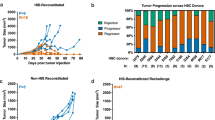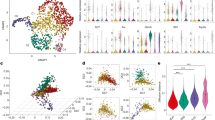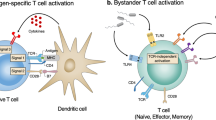Abstract
A role for T cells in immune surveillance has long been suggested1, but the lack of high tumour incidence in T cell-deficient nude mice represented a challenge to this hypothesis. The discovery of natural killer (NK) cells, which can lyse tumour cells without any previous sensitization, and high NK levels in nude mice, suggested that these cells may constitute a first line of defence against spontaneously arising tumours in vivo2. Reports3–5 of a selective NK deficiency and normal T-cell function in C57BL/6 mice carrying the beige mutation (bg/bg) suggested that these mice might be useful for assessing the relative importance of T-cell and NK-cell systems in immune surveillance. However we report here that the deficiency of beige mice is not restricted to NK cells. The generation of cytotoxic T lymphocytes (CTLs) in response to alloimmune challenge in vivo or in vitro was markedly impaired in beige mutants. Thus our results do not support the suggestion3,5 that beige mice might be useful as a model of a selective NK deficiency.
This is a preview of subscription content, access via your institution
Access options
Subscribe to this journal
Receive 51 print issues and online access
$199.00 per year
only $3.90 per issue
Buy this article
- Purchase on Springer Link
- Instant access to full article PDF
Prices may be subject to local taxes which are calculated during checkout
Similar content being viewed by others
References
Burnet, F. M. Prog. exp. Tumor Res. 13, 1–27 (1970).
Herberman, R. B. & Holden, H. T. Adv. Cancer Res. 27, 305–377 (1978).
Roder, J. & Duwe, A. Nature 278, 451–453 (1979).
Roder, J. C. J. Immun. 123, 2168–2173 (1979).
Roder, J. C., Lohmann-Matthes, M-L., Domzig, W. & Wigzell, H. J. Immun. 123, 2174–2181 (1979).
Saxena, R. K. & Adler, W. H. J. Immun. 123, 846–851 (1979).
Saxena, R. K., Adler, W. H. & Nordin, A. A. Cell. Immun. 63, 28–41 (1981).
Herberman, R. B., Nunn, M. E., Holden, H. T., Staal, S. & Djeu, J. Y. Int. J. Cancer 19, 555–564 (1977).
Cerottini, J-C. & Brunner, K. T. Adv. Immun. 18, 67–152 (1974).
Saxena, R. K., Adler, W. H. & Nordin, A. A. Immun. Commun. 9, 371–378 (1980).
Nordin, A. A. & Adler, W. H. in Developmental Immunobiology (eds Siskind, G. W., Litwin, S. D. & Weksler, M. L.) 215–229 (Grune & Stratton, New York, 1979).
Welsh, R. M. & Kiessling, R. W. Scand. J. Immun. 11, 363–367 (1980).
McKinnon, K. P., Hale, A. H. & Ruebush, M. J. Infect. Immunity 32, 204–210 (1981).
Karre, K., Klein, G. O., Kiessling, R. M. & Roder, J. C. Int. J. Cancer 26, 78–79 (1980).
Author information
Authors and Affiliations
Rights and permissions
About this article
Cite this article
Saxena, R., Saxena, Q. & Adler, W. Defective T-cell response in beige mutant mice. Nature 295, 240–241 (1982). https://doi.org/10.1038/295240a0
Received:
Accepted:
Issue Date:
DOI: https://doi.org/10.1038/295240a0
This article is cited by
-
Immunological phenotype of the murine Lrba knockout
Immunology & Cell Biology (2017)
-
Identification of the homologous beige and Chediak–Higashi syndrome genes
Nature (1996)
-
The in vivo clearance of Ha-ras transformants by natural killer cells
Clinical & Experimental Metastasis (1990)
-
Inflammatory and immunological responses to murine cytomegalovirus in resistant CBA mice
Archives of Virology (1989)
-
The cooperative effect of the Satin and Beige mutations in the suppression of NK and CTL activities in mice
Immunogenetics (1984)
Comments
By submitting a comment you agree to abide by our Terms and Community Guidelines. If you find something abusive or that does not comply with our terms or guidelines please flag it as inappropriate.



